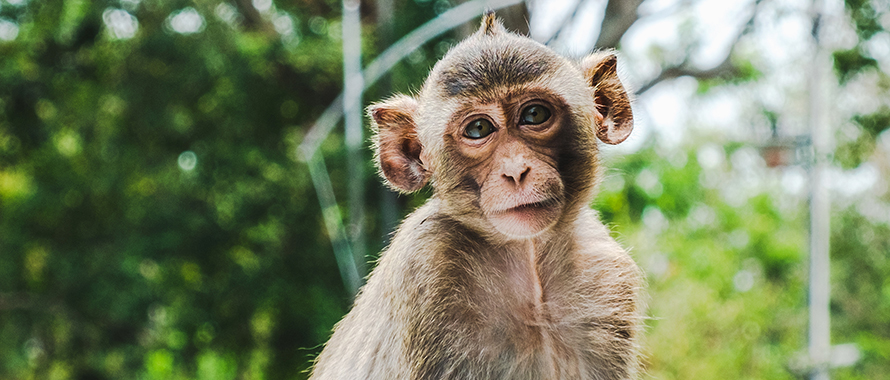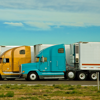Three monkeys were found and euthanized after escaping from the scene of an accident in Danville, Pennsylvania, on Jan. 21 when a dump truck collided with a pickup hauling 100 monkeys in an enclosed trailer. The cynomolgus macaque monkeys had just been flown in from the island nation of Mauritius and were headed to a CDC-approved quarantine facility when the accident occurred, tearing off the trailer’s back panel and spilling crates onto the highway. Three monkeys escaped and at least one was missing for several hours while officials searched for the animal and urged the public to keep their distance if they spotted it.
The escaped monkeys posed a health risk to the public and had to be euthanized upon their capture, CDC officials said Jan. 23. These particular monkeys are reportedly in high demand for research and valued at up to $10,000 each, underscoring the high potential cost of such an incident and the need for appropriate insurance coverage.

If each monkey is valued at roughly $10,000 and you lose several of them, whether they are dead, escape or are crippled and can no longer be used, the trucker may be on the hook for that.
“Without proper insurance a loss like this could be devastating for a business owner,” said Joshua Hart, Manager, Commercial Insurance, Burns & Wilcox, based in Traverse City, Michigan. “If each monkey is valued at roughly $10,000 and you lose several of them, whether they are dead, escape or are crippled and can no longer be used, the trucker may be on the hook for that.”
Despite the story’s outlandish nature, it is a very real example of the risks involved with hauling wildlife of any kind, said John Gambino, Cargo Manager, RB Jones, Marine, New York, New York.
“The shipment of live animals is very difficult,” he said. “Getting something safely from point A to B is the primary risk, pure and simple. The mortality issue presents a risk so very different from the vast majority of merchandise that is shipped around the globe.”
Wildlife transportation requires specialized experience, insurance
Aside from auto accidents, other major risks when transporting wildlife include harm to the animals due to movement in the trailer, temperature issues, mechanical breakdown, theft, and severe weather. Whether it is monkeys and other exotic animals or livestock such as cattle, sheep and horses, transit firms need to take specific safety precautions based on the animals they are hauling and also need to carry Animal Motor Truck Cargo Insurance, which can cover damage to cargo after an incident occurs.

The mortality issue [of transporting animals] presents a risk so very different from the vast majority of merchandise that is shipped around the globe.
“We have livestock on the highway every day, and most of the time you do not hear anything about it,” said John McGlynn, Director, Transportation, Burns & Wilcox, Toronto, Ontario. “You could have horses going to a racetrack or being sold to a new owner, or livestock going from a farm to another facility. Things like this are on the road all the time.”
When an animal is injured or dies in transit, “there would likely be an insurance claim based on the value of the animal,” McGlynn said.
Certain risks are inherent to transporting animals, Hart explained. “With animals, they are moving back and forth, they can fall, they can knock each other over,” he said. “If you are not a trucker who is experienced in hauling live animals, especially when you have a whole trailer full, it can be a lot tougher than your typical haul.”

If the monkey were to cause damage or health problems to a third party, there is liability aside from the value of the monkey that could arise from negligence. … You could have multiple parties being brought into a lawsuit.
While Animal Motor Truck Cargo Insurance policies can protect the value of the cargo itself, potential liability for third-party injuries or property damage caused by the animals while in a transit firm’s custody is another significant concern. On Jan. 24, WBRE/WYOU in Pennsylvania reported that a woman who responded to the recent monkey accident as a good Samaritan was exposed to one of the escaped monkeys on the side of the road and has since developed concerning symptoms. Further details on this specific case are not yet known, but medical expenses and other third-party injury costs can generally be covered by a company’s Truckers General Liability Insurance.
“If the monkey were to cause damage or health problems to a third party, there is liability aside from the value of the monkey that could arise from negligence,” McGlynn said. “It is unclear who that liability might rest with; one might argue the trucking operation, or the corporation or legal entity transporting the monkeys. You could have multiple parties being brought into a lawsuit.”
These cases can serve as a reminder for companies to review their liability coverage, he added. “They really need to have a Truckers General Liability Insurance policy, and maybe even Excess Liability Insurance, in the event someone contracts a disease and you end up with a very high jury award,” he said.
Expenses such as debris removal, search efforts can ‘add up very, quickly’
In September of 2020, a live export ship traveling from New Zealand to China sank after capsizing in rough seas, killing 40 crew members and about 6,000 cattle, according to a Forbes report. This type of tragic incident is part of why fewer insurance carriers are willing to get involved in certain animal transportation risks, Gambino said.
“You not only have the animal rights issues, but is it something an insurance company will want to underwrite?” he said. “It is also generally true that in the entire Cargo Insurance industry, an underwriter will usually prefer air shipments to ocean shipments, because there is less chance of theft and other perils.”
In February of 2021, a semi-truck carrying 38 cows overturned on a highway in Detroit, Michigan, leaving some of the cows injured and needing to be euthanized, WDIV Local 4 News reported. In Columbia Valley, British Columbia, on Oct. 31, 2021, a livestock transport truck ran off the road while hauling over 200 pigs, killing about 25% of the animals and leaving many others roaming the street, according to an article in the Columbia Valley Pioneer. When a semi-truck overturned in Chicago on Dec. 20, 2021, 18 cattle escaped from the trailer, 72 were trapped inside and more than 16 were killed or later euthanized, NBC Chicago reported.
Animal Motor Truck Cargo Insurance can cover the value of animals injured, killed or lost, along with other related expenses such as debris cleanup and search efforts to find missing livestock, Hart said. “It can also pay for carcass removal. With cattle, for example, that can be very, very costly to have picked up,” he said.
In the recent lab monkey accident, the value of the monkeys alone “could be anywhere from $50,000 to $100,000, plus you have the cost of going out and searching for them,” Hart said. “All of that can add up very, very quickly.”
In many policies, debris cleanup and disposition may be covered up to 10% of the insured value, Gambino noted.
Other covered expenses for Animal Motor Truck Cargo Insurance may include cargo damage due to breakdown of a trailer’s temperature controls, and cargo that is refused due to transit delays. “You see a lot of big losses out in the mountains when the vehicle simply breaks down,” Hart said. “If you have 100 monkeys and no food or water for a couple of days, that can get really dangerous. If your trailer is refrigerated or heated and it malfunctions and you have dead or sick monkeys, that could be a really big loss right there.”
Always check insurance policies for animal exclusions, sublimits
It is important to know that standard Motor Truck Cargo Insurance policies will typically not cover animals. Even with Animal Motor Truck Cargo Insurance, companies will need to ensure that the specific animal they are hauling is covered, Hart said. “A lot of these truckers do not know that,” he said, adding that smaller trucking operations will often only carry the coverage they are contractually required to have.
In Canada, Motor Truck Cargo Insurance may have coverage for animals under a sublimit. “If we had a $150,000 or $200,000 Motor Truck Cargo Insurance policy and we did not know they were transporting livestock, they could have a sublimit of $25,000, for example,” McGlynn said.
Usually, the company that owns the cargo will require the trucker to take out this type of insurance policy. Less often, the organization itself will purchase Stock Throughput Insurance, which can cover goods at all stages of the transit process until it reaches its final destination. “That way, they do not have to rely on what the trucker purchases,” Hart said. “That is on the very minority scale of how things operate, but it is absolutely an option.”
A buyer of insurance needs to know “when he has the risk and when he does not have the risk,” Gambino pointed out.
“There are importers here in the U.S. that want to control their risks, so they are placing the insurance and they can control the claim in the event something happens,” Gambino said. “The importer in the United States should, as often as possible, control his own insurance destiny by being responsible for the insurance. It may save them a few pennies to not have it or have it provided elsewhere, but those few pennies can turn into a big headache when you are filing your claim.”
Driver training, quality partnerships key to mitigating risks
In the transportation industry, a shortage of drivers is making all areas of business more difficult. In November, one report estimated that the U.S. trucking industry is short around 80,000 drivers, according to the New York Times. “That just gives you an idea of how desperate companies are to get anything hauled,” Hart said. “Many of them are so desperate that they might give a contract to almost anybody that will drive a truck. That is really scary, especially when it comes to hauling livestock. That just puts everybody at risk.”
At the same time, insurance rates are increasing and carriers are becoming more selective. “It is a tough situation for truckers right now,” Hart said.
These conditions make proper risk management even more important for trucking operations. Depending on the insurance carrier, training courses may be offered to help transportation companies implement best practices for avoiding accidents. “They go through how to properly take curves, how to properly accelerate and decelerate, how to go through mountains, and so on,” he noted. “The carriers are usually happy to send them out to work with the truckers.”
When it comes to insurance for transporting animals, it is essential to work with an experienced broker. These individuals will also be familiar with the best truckers in the industry for livestock, Hart said.
“I cannot stress how important it is to work with a broker who has an expertise in what you are hauling. You are talking about high values and serious risk,” he said. “There are probably only a handful of individuals in each state with expertise in hauling live animals, especially semi-trucks full. It is a very small world when it comes to hauling livestock. We want to make sure all of our partners are teaming up with the most quality folks they can, and that is going to mitigate a lot of the risk right there.”
Talk to your transportation broker and lawyers regularly about “the risks associated with hauling cargo and whether the coverages are appropriate for the activities of your business,” McGlynn added. “No one thinks of a monkey escaping or injuring somebody when it is scared and in a tree and it looks cute, but it could bite you,” he said. “It is always good to understand your insurance coverage because that is your biggest risk, if things go wrong related to how you operate your business and somebody gets hurt.”






